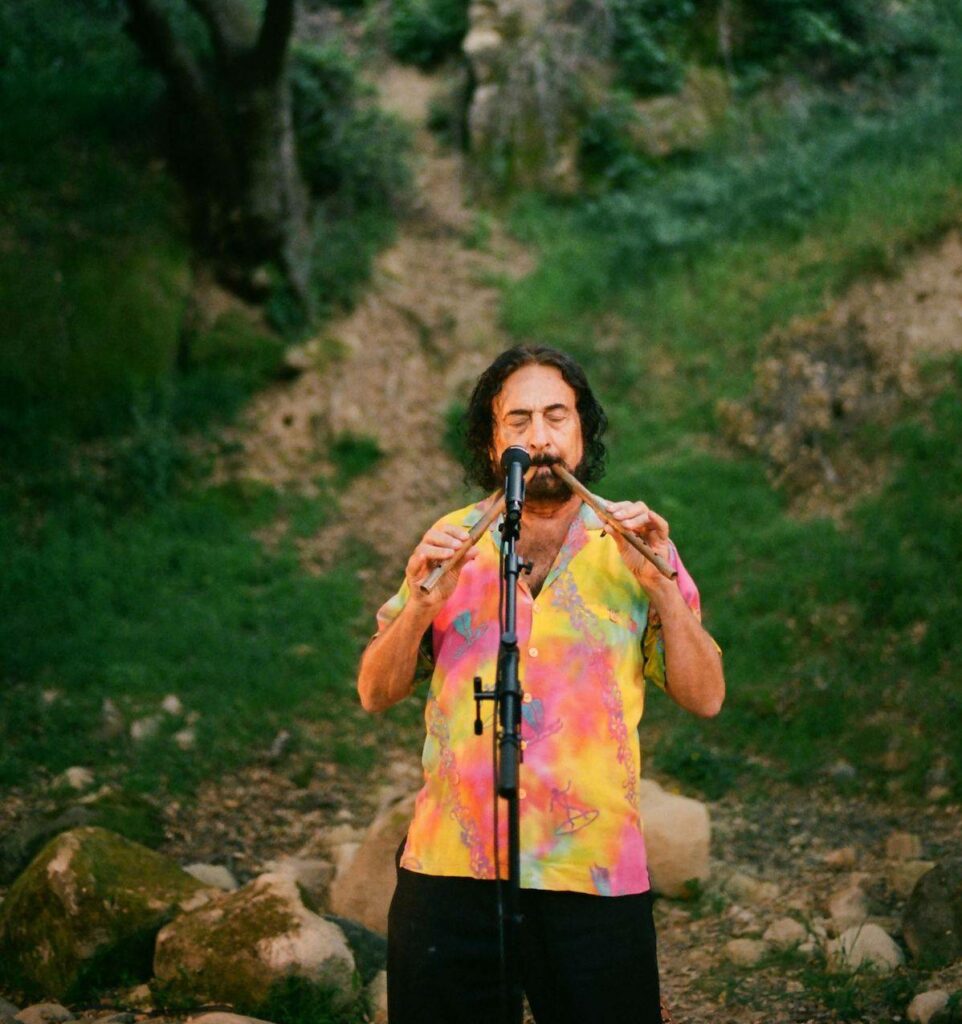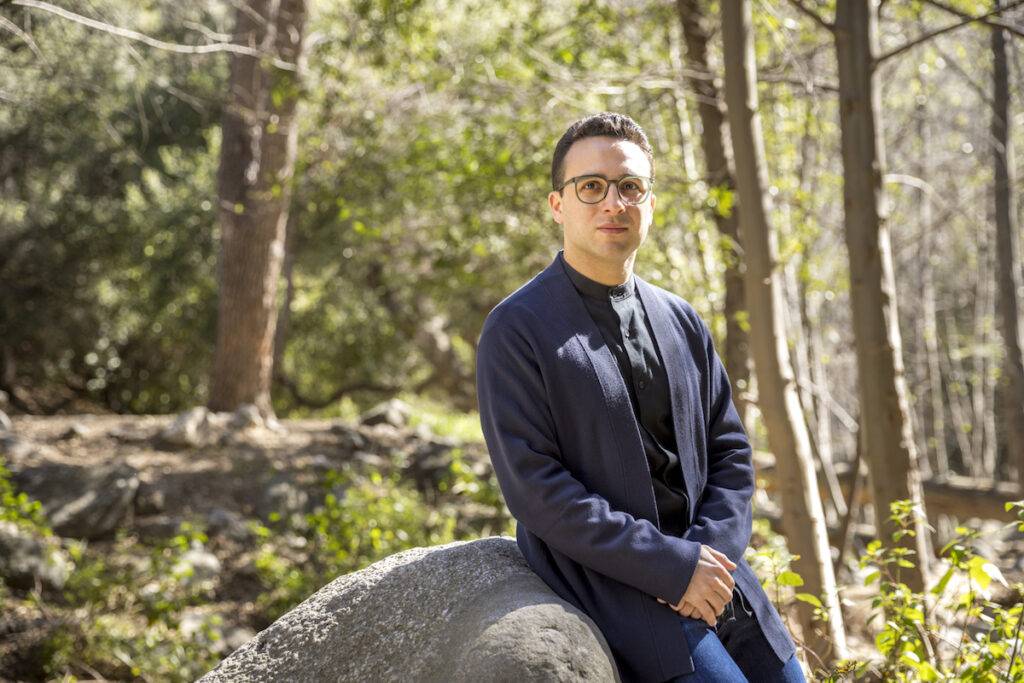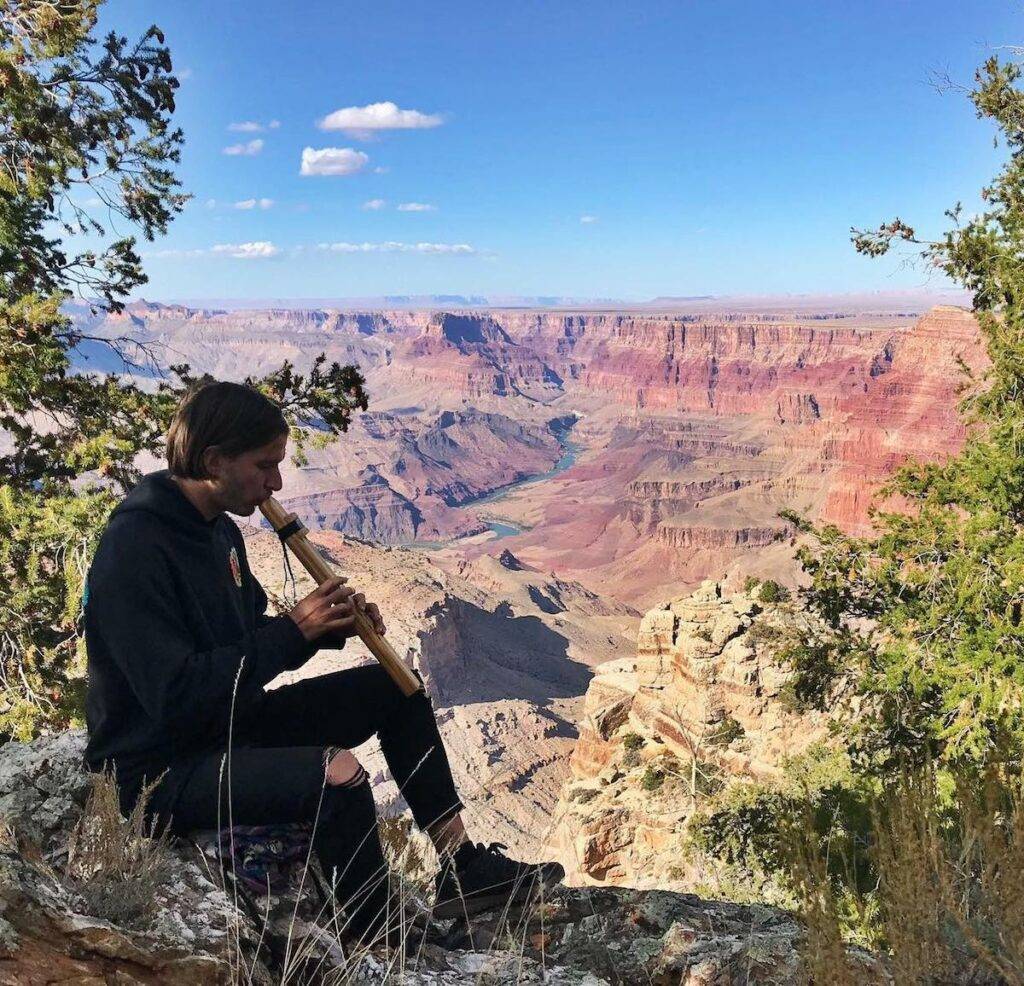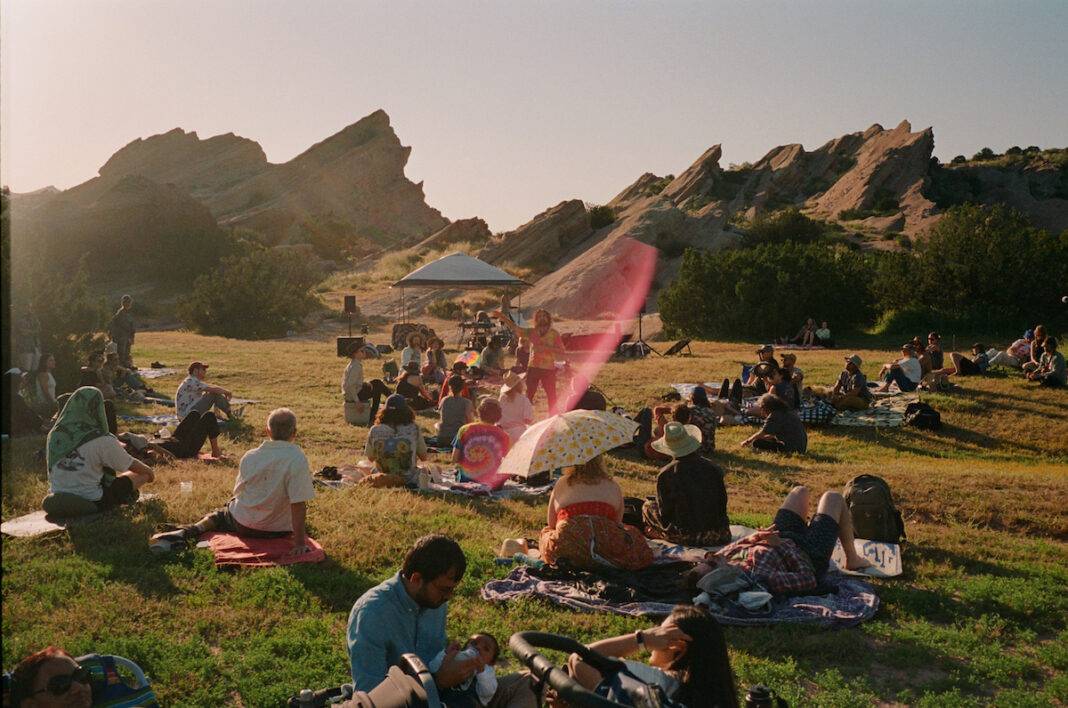Los Angeles musicians with the collective Floating, along with other instrumentalists, are collaborating with the environment to inspire activism.
Los Angeles musicians with the collective Floating, along with other instrumentalists, are collaborating with the environment to inspire activism.
Sunbeams streamed through a dense canopy of oaks as a crowd of several dozen crammed into a small outdoor amphitheater. They came to Will Geer’s Theatricum Botanicum in Topanga Canyon to see Iasos, a pioneer of new age music. Clad in a tie-dyed Hawaiian shirt, the musician paced the wooden stage barefoot. As he hit the first notes on the synthesizer, the audience buzzed with gasps and hushed “wows.” Folks glanced up at the trees. One person lay on the hillside, disappearing into the overgrown grass.
Like other concerts organized by the Los Angeles-based music collective Floating, this event encouraged attendees to connect with each other and with nature by listening to music in an outdoor green space. “Our concerts aren’t all explicitly environmental,” says Noah Klein, creative director and co-founder of Floating. “But at the core of everything is conservation and environmentalism.” I attended this concert because I wanted to see for myself if listening to music in this setting, even without explicit environmental messaging, would heighten my respect for nature.

During the concert, since Iasos’ music had no lyrics, I found myself noticing all the details of our surroundings — the way the grassy hill behind the stage sparkled in the sunlight, the shifting tones in birdsong, and the signature dusty scent of Southern California mountains. As the music dissipated into the air, I felt as if I, too, were dissolving into the natural landscape.
Despite their proximity to beaches and national parks, Angelenos tend to live daily life detached from nature. 51 percent of residents do not have a park within walking distance of their homes, with disadvantaged communities disproportionately affected. Floating and the musicians they host are part of a cohort of largely instrumental musicians in Los Angeles who are trying to harness the power of sound to restore human relationships with the environment. Through their attempts to create music that converses with and fosters respect for nature, they hope to indirectly inspire environmental activism.
Klein founded Floating in 2021, along with Brian Schopfell (who previously worked in commercial production), with the goal of providing LA with a consistent outdoor music series. Floating hosts two to three concerts per week, generally featuring instrumental musicians, though they also host singer-songwriters when they feel their lyrics won’t distract from the natural environment.
“We work almost entirely with instrumental music, just because we want there to be space for music to be in complete harmony and communion with the environment,” Klein says.
While some Floating concerts (like the one I attended) follow a traditional format, with audiences sitting in an amphitheater, at others, audience members are encouraged to lie on the ground while they listen or are guided on a hike to the concert venue.
“All life communicates through vibration,” says Aaron Allen, a professor of musicology and environment at the University of North Carolina in Greensboro.
At Floating events, music is meant to facilitate deep listening — the practice of listening in every way possible to everything you can possibly perceive, which requires intense focus and empathy. To Klein, music can hone listeners’ attention to not just the music itself, but also to the surrounding environment.
Floating’s philosophy, Klein says, is that sound has the power to transform relationships between people and nature; they believe that when music fills the air and mingles with nature’s sounds, people feel more connected with the outdoors.
“All life communicates through vibration,” says Aaron Allen, a professor of musicology and the environment at the University of North Carolina in Greensboro. Studies have found the arts to fill crucial gaps where data alone isn’t enough to spur environmental activism, because they touch people’s emotions, making climate change feel more immediate. According to Allen, music is particularly powerful in this regard, since we feel the vibrations of sound with the whole body, not merely one sense receptor. “It becomes a much more fully engaged approach to hearing the message and feeling the emotion,” he says.

When Andre Corea started composing at the age of 17, he noticed a correlation between his ambient music and his experiences in nature. Corea is a Los Angeles-based composer and environmental activist. Born in Puerto Rico and raised in Miami and Los Angeles, Corea now creates music inspired by his favorite natural spaces.
I met Corea in February at Millard Falls, a hiking trail he frequents, a few days before he performed at a Floating concert. Playing in an outdoor venue was going to be a new experience for Corea. “I’m hoping that performing my music in outdoor spaces can help people feel a more empathetic connection with their local ecosystems,” Corea told me.
As we walked along a trickling creek, we heard birds chittering and leaves rustling in the breeze — no cars, no city noises. “Nature itself has such a wide range of colors and textures and shapes that have an impact on my work, ” he says. Rather than trying to replicate nature sounds exactly in his music, Corea takes note of the way he feels in natural spaces like Millard Falls and tries to convey that emotion through song.
Corea aims to foster a sense of awe and respect for nature through his music. “Music itself should be a space for people to think and meditate,” he says. “Music is able to display that infinite imagination that nature has.”
Corea is a pioneering artist for Earth Percent in their “Earth as a Co-Writer” initiative, in which musicians credit the Earth for their music and donate a percentage of their publishing royalties to environmental causes, all while raising awareness of the ways in which music could not exist without nature. He also frequently meets with environmental groups, such as The Eyes and Ears Agency, to discuss how to use music to benefit environmental nonprofits.
At Corea’s performance in February with two other musicians, which Floating hosted in conjunction with Guardians of the Climate, he switched between pre-written music and improvisation. At some moments, the birds seemed to sing in tune with his music. “As a musician you get influenced by everything around you,” Corea says. “I don’t think we would’ve played the same stuff if we were in an indoor setting.”

Klein, who plays the flute and bass, is also interested in the conversation between music and nature. Sometimes, instead of playing music that he has composed, he brings his instruments outdoors and simply plays. He enjoys the feeling of creating songs in collaboration with nature. “I started playing toward the elements around me,” he says. If he’s playing by the ocean, he might mimic the waves or play in a way that complements their ebb and flow. If he’s in a forest, he might play along with the singing of the birds as if they are part of his ensemble.
Allen takes the notion of music conversing with nature a step further: “We tend to think of music as human, and nature as something separate,” he says. “And that’s a problem, because we are nature.”
Artists like Klein and Corea hope that their efforts will translate to activism, even if their music isn’t always conveying direct environmental messages. “From what I’ve learned in many years of direct action community organizing is that you want people to arrive at these questions and conversations for themselves,” Klein says. “If we bring people into very intentional environments and allow them to nurture and nourish and develop their own relationships with those spaces, they’re more likely to fight to conserve them,” he adds.
Klein has had countless people approach him after concerts and express a desire to volunteer in environmental causes. Floating has hosted events with groups like Tree People in the past, drawing attention to volunteer opportunities, and Klein has seen attendees get involved with conservation groups like the Audubon Society that are working to protect specific concert venues.
Most Floating concerts cost less than $50 or are donation-based. They don’t turn anyone away for lack of funds and their website encourages people who can’t afford concerts to email them. There are also membership options, which include access to all concerts and cost $9 per month for a yearly membership and $33 for a single month membership.
After Iasos’ concert, an attendee named Brian Frankel told me about how he was pondering the freeness of the natural environment around us as the music played, the organic shapes and patterns of the trees. “I felt like I didn’t have to be on shrooms or psychedelics,” Frankel said. “The music and the stillness made me focus on the details of the nature around me.”
During a post-concert Q&A, someone asked Iasos about the frog sounds he incorporated into his music. Those weren’t recorded frog sounds, he said, chuckling, those were actual frogs. The music of dusk in Topanga Canyon — the birds, frogs, and breeze — had blended into Iasos’ melodies. The performance had been punctuated with extended decrescendos that almost seemed to bow to the natural concert taking place around us.


